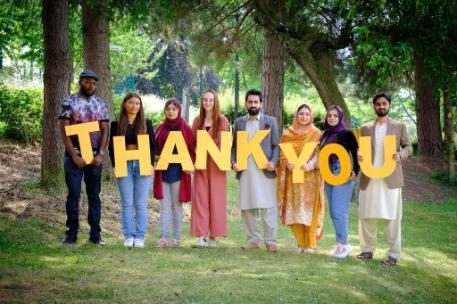Q&A with Peter Ellemann
Peter Ellemann is an alumnus of the University of Bradford having completed a BEng in Chemical Engineering with Management Economics in 1986. During Peter’s time at Bradford, he spent time in Paris and Frankfurt as part of his sandwich course, equipping him with the language skills for his future career in business.
Peter is a loan syndication professional, working with groups of lenders to fund large loans for borrowers. Peter specialises in helping to raise and structure debt for investment and non-investment grade corporates and financial institutions, allowing them to finance operations, projects, or acquisitions. Additionally, this work increasingly focusses on sustainable finance, in the areas of green loans, social loans, and sustainability-linked loans.
Peter has held roles with a number of banks in London, Paris, and Hong Kong, and was Head of Loan Syndications for Europe at ANZ in London. During Peter’s stay in Hong Kong, he spent time at a refugee camp, working in all areas from serving food up to administration and marketing. Peter is now Managing Director for Loan Syndications at ABN AMRO Bank N.V.
Peter has donated to both the Sanctuary Support Fund and the Bradford Futures Fund at the University of Bradford supporting students in most need.

What role did studying at the University of Bradford play in your life and career?
I studied a Chemical Engineering with Management Economics Bachelor’s degree over a four-year sandwich course at Bradford. Although I moved to work in London immediately upon graduating rather than going into chemical engineering, the course gave me a great basis for my subsequent career working for a number of investment and commercial banks. In particular, the 6-month placements in France and Germany that I undertook as part of my course improved my languages considerably and helped when I went on to work in Paris for two years, the finance and accounting modules in the course opened up my interest in banking, and the logical problem-solving skills proved very suited to structuring and documenting finance solutions for clients.
You spent some time working in a refugee centre in Hong Kong. Can you tell us about this and what you learned from the experience?
In 2011 I was posted to work in Hong Kong and moved there with my family, but while I was there my team was downsized, and so I took the opportunity to volunteer at Christian Action – Chungking Mansions Refugee Centre.
I spent about a year there as a jack-of-all-trades, master-of-none, doing a number of roles. I started painting and decorating the centre and supporting the food service, but I also worked on fundraising promotions and taught basic cash flow modelling to a group of female clients as part of a business skills programme, preparing them for future life once asylum was found in a host country, as Hong Kong does not permit asylum seekers to work.
That time has left a lasting impression on me. The stories of personal, family and societal trauma were shocking, but I was struck by the incredible dignity which the vast majority maintained in trying to see their way through what could possibly be years of bureaucracy while trying to maintain their mental health despite being shut off from education, employment, and a permanent home.
What these scholarship programmes at the University can give to these students is clear to me. The individuals at the refugee centre had very few opportunities available to them, and I am glad that these scholarships will open doors for others through an education at Bradford. It is my conviction that any students benefitting from the scheme will grab that opportunity and make the most of it.
What inspired you to begin donating towards scholarships at Bradford?
I was inspired to support scholarships at Bradford for two reasons. Firstly, based on my experience at the Hong Kong refugee centre I wanted to create opportunities for people who were denied them, but also with my own daughter currently at university, I was aware of the detrimental impact that Covid-19 has had on all students, but particularly on the ability of some of her peers to maintain their education once they were unable to earn money.
With my children largely through their university education, it seemed reasonable to continue supporting access to university education for those outside of my family.
What do you hope the impact will be on the scholarship recipients?
I am not sure that it is a question of hoping, as, from my own personal experience with the Hong Kong refugee programme, I am convinced that the scholarship recipients will make the most of every opportunity that their course and the wider University has to offer. Ultimately these scholarships will have a wide range of positive impacts both for them, their families, and for wider society with what they can achieve as graduates of the University.
What would be your message to other members of our alumni community who are thinking about giving to Bradford?
If you have been considering donating to help students at Bradford, you can be confident that the scholarships will be really appreciated by these young people, the awards will be properly focussed, and that the impact on the recipients through supporting their higher education will be profound and last a lifetime.

